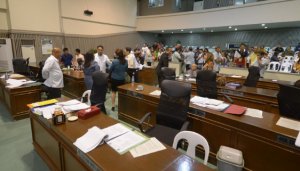 Resume writing is akin to an artform that people tend to master only after creating and revising so many of such documents. After a while, writing one becomes almost like second nature to anyone who’s been a veteran of the job market for quite some time and who has looked into more than a few “job hiring in Manila” advertisements.
Resume writing is akin to an artform that people tend to master only after creating and revising so many of such documents. After a while, writing one becomes almost like second nature to anyone who’s been a veteran of the job market for quite some time and who has looked into more than a few “job hiring in Manila” advertisements.
Still, many job applicants continue to include information that are neither pertinent to the job for which they are applying nor helpful in terms of improving their chances of getting the job they want. More often than not, doing this can actually be counterproductive because the hiring manager needs to be able to quickly browse the applicant’s qualifications without being distracted by numerous unimportant minutiae on the document.
In this short guide, we’ll discuss some of the things that you should leave off your resume for good.
The Word “Resume” on Top of Your Resume
At the risk of sounding like Captain Obvious, quite a few Filipino jobseekers continue to label their resume “resume,” prefacing the body of the document with this word written in big bold text. It should be quite plain to the hiring manager that what you are submitting is indeed a resume, so there’s really no need to include this label in the document you are sending.
An Unprofessional Email Address
Put yourself in the shoes of a hiring manager and ask yourself whether or not you’d be encouraged to get in touch with an applicant whose email address is “ehdixapuzomo@gmail.com” or “johnlloydfangirl@yahoo.com.” More likely than not, you’d be discouraged to even read past beyond their contact details, considering how they couldn’t even take the time to create a professional email for the purpose of job hunting. Make sure to update your own email address, and choose an email ID that is professional and not embarrassing.
Your Complete Home Address
While you can be sure that most HR professionals will handle your data in a secure manner, there is still that chance for your document to end up in the hands of the wrong people. There is a potential there for you to run into privacy issues, and you could even become victim to identity theft. As such, when submitting your resume, consider including only your town or city and the province where you currently reside.
Unnecessary Personal Information
In the past, job candidates in the Philippines were typically asked by employers to fill out a “bio-data” form where they are told to input all non-essential personal information. These include things like the person’s height, weight, date of birth, gender, age, and religion. These days, when writing a resume from scratch, you can leave off these items because they don’t really have any bearing on your qualification for the job. The only time you should be including any one of these informations is if it’s germane to the position you are applying for. For example, if you’re applying for the position of a flight attendant, your height is automatically something that a hiring manager will need to consider. For all other types of openings, you wouldn’t want to include personal information that can potentially lead to discrimination.
An ID Photo
For the same reason as not including any information that is too personal, you also shouldn’t be including a photo of yourself when making your resume. Otherwise you run the risk of being discriminated against, which you don’t want to happen, especially because many local government units in the Philippines have rules against such practices. Again, an exception would be when your appearance is essential to the job you are applying for. For instance, if you’re applying as an advertising model, then your prospective employer will certainly need to see photographs of you to ensure that you fit the role of the character in the print ad or the TV commercial you intend to do.
Errors in Grammar and Spelling
Understand that your resume is a reflection of your communication skills and also of how meticulous you are when it comes to doing your everyday tasks. If your resume is full of typographical and grammatical errors, you can be certain that the hiring manager or someone else from the hiring team will be able to notice it. Before sending out your resume, make sure to proofread it or run it by someone else who can make an appropriate assessment of its suitability. Ideally, you’ll want that person to have editing experience, or they should at least be proficient when it comes to writing resumes.
Inaccurate and Fallacious Information
Some job applicants will be tempted to falsify information on their resumes with the thought that doing so may up their chances of getting the job they want. Others will do this in a more tempered manner and choose instead to lie by omission or to include misleading information. If you’re thinking of doing the same, just don’t; a simple background check will reveal the truth about any information you provide. Moreover, many employers are actually quite flexible about what they need from applicants. It’s much better to discuss what you can bring to the table (despite not meeting all of their requirements) than to lie about your qualifications.
Reason for Leaving Your former Employer
Early in the application process, there’s really no reason to justify the career choices you are making. The hiring manager may ask you later on during the interview, but this information is not exactly relevant to your qualifications for any position. Moreover, you should never include anything that may be interpreted as speaking badly about your former employer.
Your Expected Salary
Similarly, your expected salary can be discussed later on in the hiring process or during the interview. Unless the prospective employer specifically asks you to include this information, it’s better to leave it off for now.
Writing a resume, especially if you’re doing it for the first time, can be challenging. Knowing about the non-essential information you shouldn’t include in this important document is the first step toward creating a resume that is concise and understandable while appropriately highlighting your actual qualifications.



